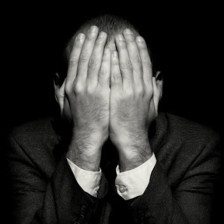You are on your 100’th self-help book and you are sure this one is the one that is going to make the difference.
You have once again been sold a bill of goods that you control your thoughts, and that the way to beat depression or to overcome your BDD is to simply change your thoughts.
News Flash, You Cannot Control Your Thoughts!
This was news to me.
I can control many things in my life:
- I can control what clothes I put on in the morning
- I can control what I put in my mouth each day
- I can control my exercise routine
- I can control my children (NOT!)
Commonplace notions of happiness are misleading, inaccurate, and can actually make you miserable.
For example, positive thinking often does NOT work — and research shows that positive affirmations make many people feel worse!
WTF!
[easyazon_link identifier=”B004TGFE3O” locale=”US” tag=”4hourlife00-20″]The happiness trap[/easyazon_link] is based on (for me at least) a new type of training.We all like to feel good, but desperately trying to avoid painful feelings dooms us to failure.
The author describes four myths that make up the happiness trap:
Four Myths:
Myth 1: Happiness is the natural state for human beings – Our culture insists that humans are naturally happy. Yet, the scary statistics regarding mental illness (1 in 10 has clinical depression, 1 in 5 is depressed at some time, 1 in 4 has or has had an addiction, 30 percent of the adult population has a recognized psychological disorder and of all those people you know almost half of these will seriously contemplate suicide at some point… and 1 in 10 will actually attempt it) tell another story.
Myth 2: If you’re not happy your defective – Our society tends to assume that psychological suffering is abnormal: a sign of a weakness or illness and a mind that is Faulty or defective.
Myth 3: To create a better life, we must get rid of negative feelings – The current trend of a “feel-good” society tells us to ELIMINATE negative feelings and ACCUMULATE the “positive.”
Myth 4: You should be able to control what you think and feel – Many current self-help programs subscribe to this myth by REPLACING NEGATIVE THOUGHTS WITH POSITIVE ONES.
These 4 basic thoughts set us up for a battle we can never win.
Acceptance and Commitment Training (ACT)
Act is based on two main principles:
- Mindfulness
- Values
1. Mindfulness is a special mental state of AWARENESS and OPENNESS. Mindfulness involves three skills.
- Skill 1: Diffusion – When you learn to defuse painful and unpleasant thoughts, self-limiting belief s and self-criticism, they have less influence on you.
- Skill 2: Expansion – This means making room for painful thoughts and feelings and allowing them to flow through you, without getting swept away by them.
- Skill 3: Connection – This means living fully in the present instead of dwelling on the past or worrying about the future.
2. Values are your heart’s deepest desires for how you want to behave as a human being; what you want to STAND FOR in life.
- In ACT, you use values to give life MEANING, PURPOSE, and DIRECTION.
- You translate values into COMMITTED ACTION: you do what really matters to you.
Why this book helps with Body Dysmorphic Disorder
You may be asking what this all has to do with overcoming BDD.
I certainly didn’t buy this book with this goal in mind, I heard about it in passing and was lucky enough to download a copy.
BDD is all about fantasies and fairytales that have developed in our mind.
These fairytales can be based on expectations we may have or stories that we have made up about ourselves.
For me they are about the way I look and the way people perceive me.
They are stories of how these perceptions of others will affect the outcome of my life.
They hold me back, they stop me from pursuing a rich and meaningful life, they hurt my wife and children.
They are useless.
As hard as I have tried to put them aside I cannot, the thoughts are here to stay.
This book is teaching me how these thoughts, these “fairytales” are simply stories. They hold no real truth, they are simply made up fairy tales, and how to diffuse these hurtful stories is the key to understanding and overcoming BDD.
And for that reason this may be the very best book ever written on the subject.
Even though it was never meant to be.
The Happiness Trap
You can download and read the book [easyazon_link asin=”1590305841″ locale=”US” new_window=”default” nofollow=”default” tag=”4hourlife00-20″ add_to_cart=”default” cloaking=”default” localization=”default” popups=”default”]The Happiness Trap: How to Stop Struggling and Start Living: A Guide to ACT[/easyazon_link] or check out the author’s website. I have also recently purchased the [easyazon_link asin=”1611801575″ locale=”US” new_window=”default” nofollow=”default” tag=”4hourlife00-20″ add_to_cart=”default” cloaking=”default” localization=”default” popups=”default”]The Illustrated Happiness Trap: How to Stop Struggling and Start Living[/easyazon_link] and I really like it. The cartoons are a great summary of the book and I plan on sharing it with my children.

